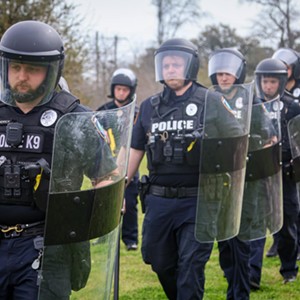In the councils of government, we must guard against the acquisition of unwarranted influence, whether sought or unsought, by the military-industrial complex. The potential for the disastrous rise of misplaced power exists and will persist. - President Dwight D. Eisenhower, Jan. 17, 1961
DWIGHT D. EISENHOWER is probably my favorite president. A patient, effective and wise Supreme Commander of Allied forces in Europe during World War II, he also deserves much more credit as a capable, drama–free president than he usually receives.
Fifty years ago this Monday, Eisenhower made one of the most important and most prescient public statements ever made by an American president — indeed, by any world leader at any time.
Despite all the other things going on both locally and nationally, I want to write about Ike’s speech here this week because, frankly, you’re unlikely to hear much, if anything, about this amazing statement anywhere in the mainstream media. Indulge me.
Delivered as a farewell address to the nation after his eight years in the White House, the televised speech — the subject of furious editing and rewriting by Ike personally — was short on empty platitudes and long on far–seeing vision.
By the standards of today’s dumbed-down, often violently-themed political talk, Ike’s gem is like Shakespeare to an ape’s grunting. But even by the higher standards of political comportment of the early ’60s, it was remarkable.
Eisenhower’s predictive power in the speech is Nostradamus–like in its crystal vision of a national security state run amok, of the Pentagon tail wagging the national dog — a syndrome he immortally labelled the “military–industrial complex”:
This conjunction of an immense military establishment and a large arms industry is new in the American experience. The total influence — economic, political, even spiritual — is felt in every city, every Statehouse, every office of the Federal government. We recognize the imperative need for this development. Yet we must not fail to comprehend its grave implications. Our toil, resources and livelihood are all involved; so is the very structure of our society.
This is no bundle of vague anxieties that Eisenhower has. Without actually saying the word “internet,” he nonetheless predicts the explosion of computer–driven technology that would eventually render ethics nearly irrelevant, as well as the unholy matrimony of elected officials and the defense contractors that buy their influence:
Akin to, and largely responsible for the sweeping changes in our industrial–military posture, has been the technological revolution during recent decades.
In this revolution, research has become central, it also becomes more formalized, complex, and costly. A steadily increasing share is conducted for, by, or at the direction of, the Federal government.
Today, the solitary inventor, tinkering in his shop, has been overshadowed by task forces of scientists in laboratories and testing fields. In the same fashion, the free university, historically the fountainhead of free ideas and scientific discovery, has experienced a revolution in the conduct of research. Partly because of the huge costs involved, a government contract becomes virtually a substitute for intellectual curiosity. For every old blackboard there are now hundreds of new electronic computers.
The prospect of domination of the nation’s scholars by Federal employment, project allocations, and the power of money is ever present — and is gravely to be regarded.
Yet, in holding scientific research and discovery in respect, as we should, we must also be alert to the equal and opposite danger that public policy could itself become the captive of a scientific–technological elite.
Forgive me for the lengthy quote, but it’s important to read the words for yourself and realize that, in the ensuing five decades since they were spoken, hundreds of reporters and commentators have warned of the same problem — but never as effectively, as clearly, and as powerfully as Ike did himself, when first realizing it.
“Partly because of the huge costs involved, a government contract becomes virtually a substitute for intellectual curiosity.”
Can you imagine a modern president saying anything so succinct, so unadorned by focus group shenanigans, so... correct?
I despise historical revisionism and I don’t want to be accused of it here. While Eisenhower bemoans the military–industrial complex and its potential to corrupt and destroy a great country, he’s certainly not making an argument for pacifism. He makes it clear that its formation was necessary to fight the scourge of communism.
Likewise, though Eisenhower would be considered far too liberal to be nominated by his Republican Party today — even back then his loathing of his far–right vice president, Richard Nixon, was legendary — he was still a Republican. In the speech he opposes not only the expansion of the federal military apparatus, but all big government subsidies.
Still, we shouldn’t downplay its impact either, and the fact that Ike’s speech is largely unremarked today and his advice almost completely unheeded by subsequent presidents shouldn’t negate its value.
His point is not that he did the wrong thing in helping to form the military–industrial complex, but — in the same vein that Benjamin Franklin warned that the founding fathers gave us “a republic, if we could keep it” — that future generations should be vigilant about its influence and its effects.
How’s that working out for us?
Fifty years after Ike’s speech, American military spending equals that of the next 15 countries combined, and still expanding even in a time of severe recession.
Even more stunning, the U.S. accounts for nearly half — 46 percent — of all the world’s military spending. The second–place spender, China, accounts for a mere 6.6 percent — a little more than one–tenth of our total.
So is the world getting any safer? Do you feel any safer? Where does it end?
As for the rest of the world, they now view America not as the avenging angel of Eisenhower’s time, the benevolent superpower who destroyed Germany and Japan and immediately helped rebuild them in the name of democracy and civilization.
Today we’re known in other countries mainly by our unmanned drones high in their skies seeking out targets, our rendition and waterboarding of suspects without charge or trial, the secret prisons we build in their backyard so that our own beloved Constitution won’t apply, and unaccountable private contractors doing the job that conscripted citizen soldiers did in Eisenhower’s time.
Clearly, Ike was right. If you want to see a great American in one of his finest moments, watch the speech and listen to him deliver it for yourself. And then ask yourself how well we’ve followed his sage advice.































